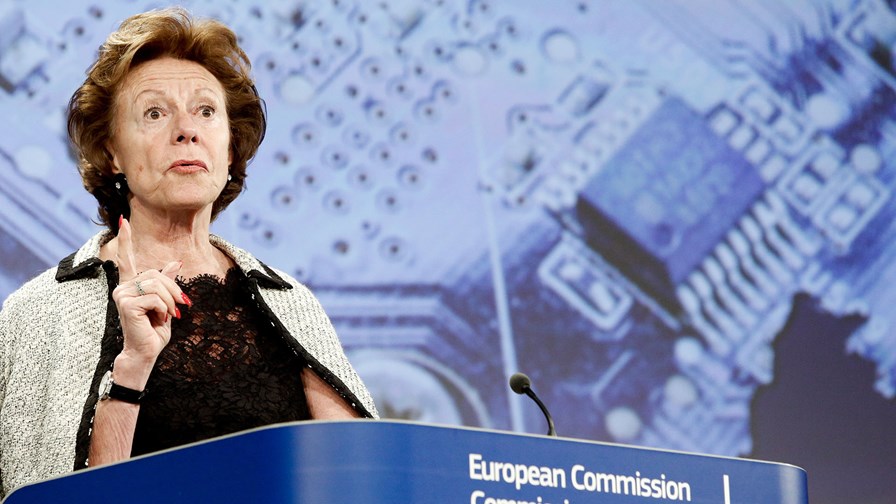
© EC
Neelie Kroes has been playing Mrs McGonagall again. Standing at the lectern at the end of term (hers) and scolding the telecoms industry and its leaders for being unworthy of Hogwarts and all that it stands for. If I was a telco leader I’d be getting just a teensy-weensy bit sick of the hectoring tone by now (this is only her second valedictory, but she delivered many a lecture in similar blunt style though her years as information commissioner).
The occasion was Broadband World Forum in Amsterdam yesterday. If anything Neelie was more attack dog than normal and in her usual style she exaggerated… a lot.This bit is at the end, but it’s worth quoting in full at the beginning of this, just to set the tone.
“Once again – it’s about a little less confrontation and a little more action. I want to see one Europe, not two Europes. I can still remember what war was like, and what Europe looked like after the war – my whole childhood, my university, my life as a national Minister: I spent all of it during a time of Two Europes. And if I believe anything in this world it is that we cannot go back to a world of Two Europes.
"But healing these new divisions starts with everyone in this room. We agree on more than we disagree on. We are part of something bigger than our own opinions, our own company, our own country. We are part of one Europe – and it is time to compromise and start building it again.”
Wow! I didn’t know we’d broken it. But then the apocalyptic vision was her trademark and it came most forcefully when the state of the European telecoms industry was the talking point. If confidence in our digital prospects is now lacking in Europe then Neelie - along with the great recession - have to share a good deal of the blame.
Neelie it was who found it necessary to exaggerate (I paraphrase the words of the competition commissioner, Joaquín Almunia) the state of European telecoms. In particular, she advanced the logic that, because some US carriers had moved faster to invest in LTE. and because LTE was apparently ‘next generation’ (it isn’t, it’s part of 3G, the clue is in the descriptor, Long Term Evolution) then Europe had somehow irrevocably fallen behind. There is so much wrong with this notion, starting with the fact that it isn’t even nearly true, that it’s difficult to know where to start with it.
The numbers show that, just in mobile, Europe hasn’t fallen behind. Despite the extra LTE, US and European mobile data speeds, on average, are fairly comparable. Both the US and Europe fall way behind South Korea and Japan, but when it comes to service cost, UK is still ahead of the US (cheaper for users). And by last year LTE and faster HSPA (3G data) technologies were near 50 per cent of the European market.
On the fixed network, fast and ultra-fast broadband, it’s true, only accounts for 13 per cent of households, but in many national territories mid-speed services (say around 17Mbit/s) are not only available but are very cheap by US standards.
The notion that Europe had fallen behind, though, was apparently necessary if Neelie was to get traction with her Connected Continent proposals. According to the background rationale we were somehow disconnected and fragmented. We needed consolidation and pan-European network ownership along US lines if we were to ‘catch-up’.
Good grief! Since when did monopoly (or near monopoly) lead to an uptick in entrepreneurial activity; since when did high-priced data services lead to a buoyant and fast-growing services market?
Maybe it’s just me, but Neelie seems to have quietly rowed back from her AT&T obsession of two or three years’ back. Yesterday we had a long passage addressed to the telecoms leaders about letting go and embracing the digital and the new.
Neelie Kroes: “It comes down to this question: is Europe’s leadership class willing to be excited about innovation and startups? Or is Europe going to be exhausted by using up its energy safeguarding vested interests, and holding up ancient barriers?
“We need to ask if we can reinvent ourselves. And if we are willing to be led to a digital renaissance based on an open mindset and a belief that we can be the best if we want to be. I still don’t know how Europe will answer. I believe this renaissance is possible, but in my mind there are too many leaders still refusing to take up their responsibility.”
Perhaps on second thoughts she’s decided that a handful of giant European telcos is not the way to that European IT market of tomorrow after all.
Email Newsletters
Sign up to receive TelecomTV's top news and videos, plus exclusive subscriber-only content direct to your inbox.




